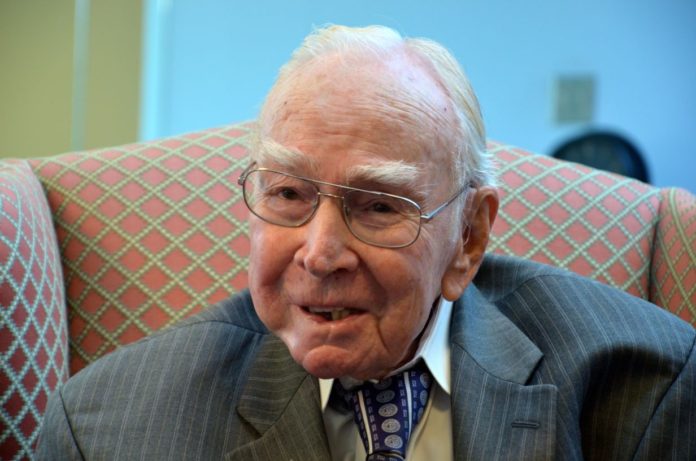Jim Wright, Fort Worth’s congressman for 34 years and former Speaker of the U.S. House of Representatives, has died. He was 92.
Wright, who had been living in a nursing home in Fort Worth, died early Wednesday morning, according to Thompson’s, Harveson and Cole funeral home in Fort Worth. Funeral arrangements are pending.
Wright represented the 12th Congressional District from 1955 until his resignation in 1989. He was the Democratic majority leader in the House for a decade, rising to the speakership in January 1987, replacing Tip O’Neill.
Wright’s resignation from Congress came at the end of a nearly yearlong investigation by the House Ethics Committee into Wright’s financial affairs. The investigation was undertaken at the urging of Republican Congressman Newt Gingrich, who later became Speaker of the House and eventually left Congress amid an ethics scandal of his own.
The committee accused Wright of scheming to evade limits on outside earnings by self-publishing a book, “Reflections of a Public Man,” he then sold in bulk. He was also accused of improperly accepting $145,000 in gifts over 10 years from a Fort Worth developer. In response, Wright said he had not violated any House rules and vowed to fight the charges but his support among fellow Democrats quickly eroded. In a floor speech on April 30, 1989, that ended with the announcement of his resignation, Wright called for an end to “mindless cannibalism” and decried what he called “this manic idea of a frenzy of feeding on other people’s reputation.”
The episode proved to be a harbinger of the rising partisanship within the House and the personal attacks between House members that would mark the chamber for much of the last quarter-century.
James Claude Wright Jr. was born in Fort Worth on Dec. 22, 1922, the son of a professional boxer-turned-tailor. After the attack on Pearl Harbor in December 1941, he left college to enlist in the U.S. Army and flew combat missions in the South Pacific, earning the Distinguished Flying Cross and the Legion of Merit.
He served in the Texas House for one term and at 26 became mayor of Weatherford, his boyhood hometown. He served for four years, 1950-54, before his first congressional victory.
Often praised for his eloquence and oratorical skills, Wright was a disciple of House Speaker Sam Rayburn, a fellow Texan. He also was a confidant of Lyndon B. Johnson, who served in the Senate during Wright’s initial years in Congress before becoming vice president in 1961. Wright lost a special election to fill Johnson’s Senate seat that year.
Wright was in the presidential motorcade on Nov. 22, 1963, when President John F. Kennedy was assassinated in Dallas. “To describe the depth of sadness that engulfed us that day defies vocabulary,” he once said, recalling how the friendly mood of the Dallas crowds turned to “sheer terror and horror.” His friend Johnson became president that day.
In his long House career, Wright was the author of major legislation in several fields but was most proud of his efforts on behalf of a “pay-as-we-go” interstate highway system and water conservation.
He helped President Jimmy Carter fashion the 1978 Camp David agreement that led to peace between Israel and Egypt, and he played a pivotal role in bringing about a negotiated settlement in Central America that later led to the 1990 elections in Nicaragua in which the leftist Sandinista government lost. Like many Democrats, he had opposed the Reagan administration’s emphasis on military pressure to fight Marxism there.
In his home state, Wright’s influence was felt long after he left office because of the Wright Amendment, which restricted direct commercial air travel from Love Field, near downtown Dallas, to nearby states. The amendment, passed in 1979, was designed to foster growth at the new Dallas-Fort Worth International Airport. In 2006, President George W. Bush signed legislation to repeal the amendment and loosen some flight restrictions.
After leaving Congress, Wright made dozens of speeches around the country, particularly at universities and was a consultant for a petroleum company. For nearly 20 years he taught a popular political science course at Texas Christian University.
In addition to writing a weekly column for the Fort Worth Star-Telegram for more than 10 years, he wrote several books. “Worth It All: My War for Peace” (1993) looked at the U.S.-Nicaraguan/Central America peace effort. In 1996 he wrote “Balance of Power: Presidents and Congress from the Era of McCarthy to the Age of Gingrich,” and in 2005 he revisited the war years in “The Flying Circus: Pacific War –1943 – as Seen Through a Bombsight.”
In 1991, Wright lost part of his tongue to cancer. He had more surgery in 1999 to remove and reconstruct parts of his jawbone and tongue when the cancer returned.
More on Jim Wright:
Wright helped fuel Fort Worth’s economy
JFK was a key figure in Jim Wright’s long career
Rep. Jim Wright’s resignation speech – video and written copy – is available here:
http://www.americanrhetoric.com/speeches/jimwrightresignation.htm
Jim Wright tribute from Fort Worth Chamber’s JFK event:
Produced by Parker Vandergriff/Courtesy of Fort Worth Chamber.






